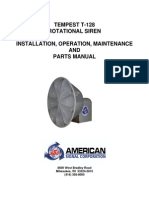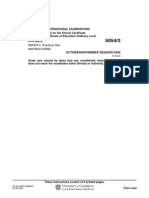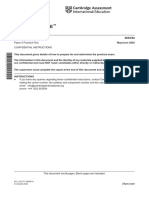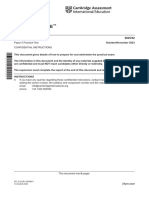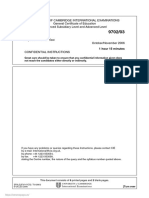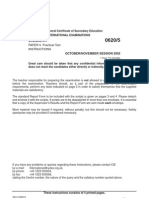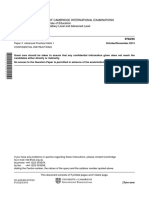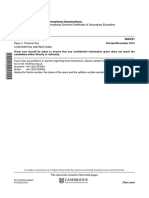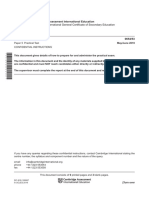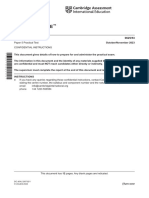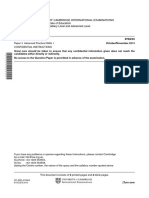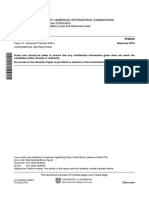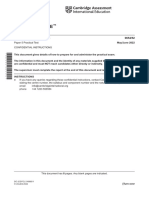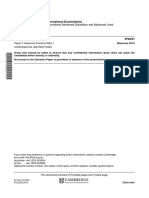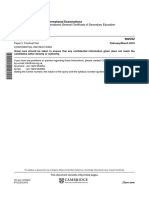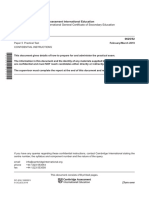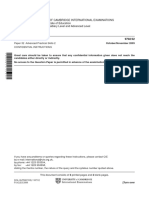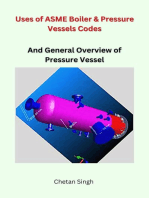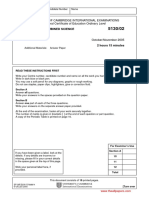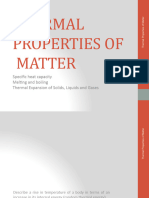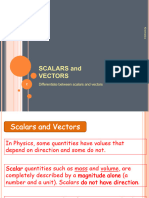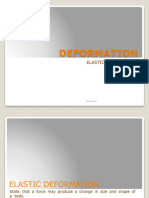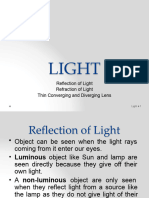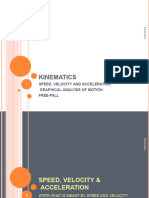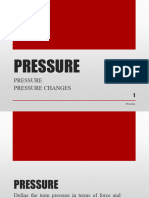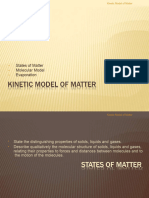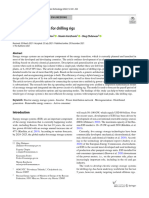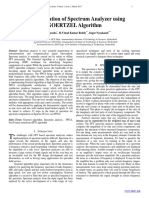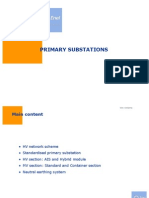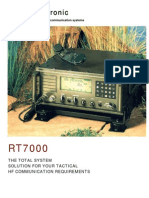Combined Science: PAPER 5 Practical Test Confidential Instructions
Combined Science: PAPER 5 Practical Test Confidential Instructions
Uploaded by
rodel.verzosaCopyright:
Available Formats
Combined Science: PAPER 5 Practical Test Confidential Instructions
Combined Science: PAPER 5 Practical Test Confidential Instructions
Uploaded by
rodel.verzosaOriginal Title
Copyright
Available Formats
Share this document
Did you find this document useful?
Is this content inappropriate?
Copyright:
Available Formats
Combined Science: PAPER 5 Practical Test Confidential Instructions
Combined Science: PAPER 5 Practical Test Confidential Instructions
Uploaded by
rodel.verzosaCopyright:
Available Formats
International General Certificate of Secondary Education
CAMBRIDGE INTERNATIONAL EXAMINATIONS
COMBINED SCIENCE 0653/5
PAPER 5 Practical Test
CONFIDENTIAL INSTRUCTIONS
MAY/JUNE SESSION 2002
1 hour 30 minutes
Great care should be taken that this confidential information does not
reach the candidates either directly or indirectly.
The Supervisor’s attention is drawn to the form on page 5 which must be completed and
returned with the scripts.
These instructions consists of 5 printed pages and 3 blank pages.
(NH/CG) S24697/2
© CIE 2002 [Turn over
http://www.xtremepapers.net
2
Instructions for preparing apparatus
These instructions detail the apparatus, reagents and specimens required by each candidate for each
experiment in this paper. A summary of the questions that will be presented to the candidates is
included, where appropriate, to allow the teacher to test the apparatus appropriately. No access is
permitted to the question paper in advance of the examination session.
It is assumed that the ordinary apparatus of a science laboratory will be available, including a supply of
purified water (distilled or deionised).
If arrangements are made for different sessions for different groups of candidates, care must be taken
to ensure that the different groups of candidates are effectively isolated so that no information
passes between them.
For Question 1
Each candidate will require:
(i) three test-tubes 125 mm x 15 mm, one of which should be made of hard glass;
(ii) a large test-tube 150 mm x 25 mm;
(iii) some Universal Indicator solution;
(iv) about 20 cm3 of dilute hydrochloric acid, concentration about 1 mol dm–3;
(v) limewater and means of testing for carbon dioxide;
(vi) a Bunsen burner;
(vii) about 3 g of potassium hydrogencarbonate, labelled ‘P’;
(viii) a 0–110 °C thermometer.
0653/5 Inst M/J/02
3
For Question 2
Each candidate will require:
(i) a 1.5 V cell in a holder (or with means to connect it into a circuit). The voltage of the cell is to
be given to candidates;
(ii) 4 connecting wires, two of which should terminate with crocodile clips at one end;
(iii) a switch;
(iv) 0.8 m length of wire which has a resistance of approximately 12 ohms per metre, attached to
a metre rule with one end of the wire at the zero mark, (see diagram). All candidates should
be provided with wire of the same type;
(v) a fixed resistor between the cell and zero end of the test wire. This is to protect the ammeter
when the length of test wire approaches zero. A 1 ohm resistor should be suitable. The value
of this resistor must be recorded in the report;
(vi) a 0–1 A ammeter. It is important to make sure that with 10 cm of wire in the circuit, the
reading is on the scale. If there is difficulty in providing 0–1 A ammeters, it is permissible to
alter the voltage of the cell provided, the resistance of the fixed resistor and/or of the wire to
suit the available ammeters. Any such alterations must be recorded on the appropriate sheet.
(vii) The apparatus should be set up for candidates as shown in the diagram below.
ammeter
fixed
A resistor
crocodile
clip
test wire switch
metre
rule
100 cm 0
0653/5 Inst M/J/02 [Turn over
4
For Question 3
Instructions for preparation
Several dishes of seeds should be sown in preparation for this practical. A fast-growing type of seed
should be used. Mustard or cress are ideal. They should be prepared a few days in advance. The aim
is to get seedlings about 2–3 cm high in dish A with well-developed leaves showing. There should be
little or no growth in dish C. This should take about 4 days, but will vary according to the temperature.
A trial is advised to assess the suitability of the seeds and growing times. The dishes should show the
growth patterns indicated in the note for Supervisors.
The seeds should be grown on cotton wool or absorbent paper in shallow containers, e.g. petri dishes.
There should be the same number of seeds in each dish, at least 20, spread out evenly.
The dishes should all be kept in identical temperatures, and illuminated identically and evenly. If light
comes from one side the dishes should be turned regularly.
Each candidate will require:
(i) 3 dishes labelled A, B and C. Two or three candidates may share one set of dishes between
them. They should all be grown identically as described except:
Dish A should be watered using distilled or deionised water,
Dish B should be watered using a solution made up by adding 0.3 cm3 of 1 M sulphuric acid
to 1 litre of distilled water,
Dish C should be watered using a solution made up by adding 1.0 cm3 of 1 M sulphuric acid
to 1 litre of distilled water.
Solutions for B and C must be made up accurately. A 1.0 cm3 syringe or pipette should be used.
(ii) a pair of forceps;
(iii) a ruler (15 cm length will do).
Note for Supervisors:
Dish A good germination and growth,
Dish B seeds germinated but growth either reduced or non-existent,
Dish C some germination but no growth.
Information required from the Supervisor:
The Supervisor is asked to carry out the experiments and to enter the results on a spare copy
of the examination paper, clearly marked ‘Supervisor’s Results’ and showing the Centre
number. This should be returned with the scripts. Failure to do so may cause the candidates to
be penalised.
0653/5 Inst M/J/02
5
0653/5
This form must be completed and returned in the envelope with the scripts together with the
seating plan and the Supervisor’s Results mentioned below.
May/June 2002
General
The Supervisor is invited to give details of any difficulties experienced by particular candidates giving
their names and candidate numbers. These should include reference to:
(a) difficulties due to faulty apparatus;
(b) accidents to apparatus or materials;
(c) physical handicaps, e.g. short sight, colour blindness;
(d) any other information that is likely to assist the Examiner, especially if this cannot be
discovered in the scripts;
(e) any help given to a candidate.
The Supervisor is asked to supply the following information:
Plan of work benches, giving details by candidate numbers of the places occupied by the candidates
for each session and a copy of the ‘Supervisor’s Results’.
NAME OF CENTRE .................................................................................................................................
SIGNED ................................................................
Supervisor
CENTRE NUMBER ...................................................
DECLARATION (to be signed by the Principal)
The preparation of the practical examination has been carried out so as to maintain fully the security of
the examination.
NAME .......................................................................................................................................................
(in block capitals)
SIGNED ...................................................................................................................................(Principal)
✃
0653/5 Inst M/J/02
6
BLANK PAGE
0653/5 Inst M/J/02
7
BLANK PAGE
0653/5 Inst M/J/02
8
BLANK PAGE
0653/5 Inst M/J/02
You might also like
- Emergency Siren System-T 128 ManualDocument42 pagesEmergency Siren System-T 128 ManualUsman Zouque100% (1)
- TP6710 - Operation Manual 7-28EFOZDDocument52 pagesTP6710 - Operation Manual 7-28EFOZDAnonymous M0OEZEKoGi100% (1)
- VTP8 Series Frequency Inverter ManualDocument70 pagesVTP8 Series Frequency Inverter ManualpiernodoyunaNo ratings yet
- Cambridge IGCSE: PHYSICS 0625/52Document12 pagesCambridge IGCSE: PHYSICS 0625/52Ar Ar ViNo ratings yet
- Chemistry: Cambridge International Examinations International General Certificate of Secondary EducationDocument4 pagesChemistry: Cambridge International Examinations International General Certificate of Secondary EducationVarun PanickerNo ratings yet
- ChemistryDocument8 pagesChemistryKelvin SerimweNo ratings yet
- Cambridge IGCSE: PHYSICS 0625/51Document8 pagesCambridge IGCSE: PHYSICS 0625/51NabihahNo ratings yet
- Physics: PAPER 3 Practical Test InstructionsDocument8 pagesPhysics: PAPER 3 Practical Test Instructionsmstudy123456No ratings yet
- Cambridge IGCSE: Combined Science 0653/52Document8 pagesCambridge IGCSE: Combined Science 0653/52Hin Wa LeungNo ratings yet
- University of Cambridge International Examinations General Certificate of Education Ordinary LevelDocument12 pagesUniversity of Cambridge International Examinations General Certificate of Education Ordinary Levelmstudy123456No ratings yet
- Combined Science: PAPER 5 Practical Test Confidential InstructionsDocument4 pagesCombined Science: PAPER 5 Practical Test Confidential InstructionsAr Ar ViNo ratings yet
- Cambridge IGCSE: PHYSICS 0625/53Document8 pagesCambridge IGCSE: PHYSICS 0625/53ijayce.yangNo ratings yet
- Cambridge IGCSE: PHYSICS 0625/51Document8 pagesCambridge IGCSE: PHYSICS 0625/51nyiNo ratings yet
- Cambridge IGCSE: PHYSICS 0625/52Document8 pagesCambridge IGCSE: PHYSICS 0625/52nexusdrops1No ratings yet
- PhysicsDocument8 pagesPhysicsPoul WilsonNo ratings yet
- 0625 m17 Ci 52 PDFDocument8 pages0625 m17 Ci 52 PDFThunderNo ratings yet
- Combined SciencesDocument4 pagesCombined SciencesChong Xue ErNo ratings yet
- Chemistry: PAPER 3 Practical Test Confidential InstructionsDocument8 pagesChemistry: PAPER 3 Practical Test Confidential InstructionsHendrawan SaputraNo ratings yet
- PhysicsDocument8 pagesPhysicsnsumbajosephtimothyNo ratings yet
- Cambridge International Advanced Subsidiary and Advanced LevelDocument8 pagesCambridge International Advanced Subsidiary and Advanced LevelHafsah JoomunNo ratings yet
- Cambridge International General Certificate of Secondary EducationDocument8 pagesCambridge International General Certificate of Secondary EducationTao FanNo ratings yet
- Cambridge International General Certificate of Secondary EducationDocument8 pagesCambridge International General Certificate of Secondary EducationTao FanNo ratings yet
- Chemistry: PAPER 5 Practical Test InstructionsDocument4 pagesChemistry: PAPER 5 Practical Test InstructionsVarun PanickerNo ratings yet
- University of Cambridge International Examinations General Certificate of Education Advanced Subsidiary Level and Advanced LevelDocument8 pagesUniversity of Cambridge International Examinations General Certificate of Education Advanced Subsidiary Level and Advanced LevelUmnah SaifNo ratings yet
- Cambridge International General Certificate of Secondary EducationDocument8 pagesCambridge International General Certificate of Secondary Educationyuke kristinaNo ratings yet
- 9702 s10 Ir 31 PDFDocument8 pages9702 s10 Ir 31 PDFredwanNo ratings yet
- Chem Paper 52Document8 pagesChem Paper 52SKNo ratings yet
- Cambridge International General Certificate of Secondary EducationDocument8 pagesCambridge International General Certificate of Secondary EducationterrencendabambiNo ratings yet
- PhysicsDocument8 pagesPhysicsPeter TaremwaNo ratings yet
- Cambridge International General Certificate of Secondary EducationDocument12 pagesCambridge International General Certificate of Secondary EducationLongNo ratings yet
- 5070 - 3 Ins Chemistry s00Document8 pages5070 - 3 Ins Chemistry s00Fatima Tuz ZahraNo ratings yet
- Cambridge International General Certificate of Secondary EducationDocument12 pagesCambridge International General Certificate of Secondary EducationterrencendabambiNo ratings yet
- Physics: InstructionsDocument8 pagesPhysics: InstructionsEn DimunNo ratings yet
- 2023 Specimen Paper 5 Confidential InstructionsDocument10 pages2023 Specimen Paper 5 Confidential InstructionsindoswissNo ratings yet
- Cambridge IGCSE: PHYSICS 0625/52Document8 pagesCambridge IGCSE: PHYSICS 0625/52ijayce.yangNo ratings yet
- University of Cambridge International Examinations International General Certificate of Secondary EducationDocument12 pagesUniversity of Cambridge International Examinations International General Certificate of Secondary EducationAr Ar ViNo ratings yet
- Cambridge O Level: PHYSICS 5054/31Document12 pagesCambridge O Level: PHYSICS 5054/31Clarence OngNo ratings yet
- Cambridge IGCSE: PHYSICS 0625/53Document12 pagesCambridge IGCSE: PHYSICS 0625/53nexusdrops1No ratings yet
- University of Cambridge International Examinations International General Certificate of Secondary EducationDocument8 pagesUniversity of Cambridge International Examinations International General Certificate of Secondary EducationHany ElGezawyNo ratings yet
- Cambridge International General Certificate of Secondary EducationDocument12 pagesCambridge International General Certificate of Secondary EducationLongNo ratings yet
- 5070 w03 Ir 3Document8 pages5070 w03 Ir 3mstudy123456No ratings yet
- Physics: University of Cambridge International Examinations General Certificate of Education Ordinary LevelDocument12 pagesPhysics: University of Cambridge International Examinations General Certificate of Education Ordinary Levelmstudy123456No ratings yet
- Co-Ordinated Sciences: PAPER 5 Practical Test Confidential InstructionsDocument4 pagesCo-Ordinated Sciences: PAPER 5 Practical Test Confidential Instructionsyashasgupta01No ratings yet
- Physics: University of Cambridge International Examinations General Certificate of Education Ordinary LevelDocument8 pagesPhysics: University of Cambridge International Examinations General Certificate of Education Ordinary Levelmstudy123456No ratings yet
- 0653 m17 Ci 52 PDFDocument8 pages0653 m17 Ci 52 PDFpadma sailajaNo ratings yet
- Physics: Cambridge International Examinations General Certificate of Education Ordinary LevelDocument12 pagesPhysics: Cambridge International Examinations General Certificate of Education Ordinary LevelequakeroatsNo ratings yet
- University of Cambridge International Examinations General Certificate of Education Advanced Subsidiary Level and Advanced LevelDocument8 pagesUniversity of Cambridge International Examinations General Certificate of Education Advanced Subsidiary Level and Advanced LevelSena PrayogaNo ratings yet
- 9702 s10 Ir 33 PDFDocument8 pages9702 s10 Ir 33 PDFredwanNo ratings yet
- 4003q3n2018instr - Specimen Paper PDFDocument8 pages4003q3n2018instr - Specimen Paper PDFgrayNo ratings yet
- 9702 w12 Ir 36 PDFDocument8 pages9702 w12 Ir 36 PDFDewan Olin ChotepadaeNo ratings yet
- Cambridge IGCSE: PHYSICS 0625/52Document12 pagesCambridge IGCSE: PHYSICS 0625/52arif asgarNo ratings yet
- 0610 s04 QP 5Document8 pages0610 s04 QP 5kangyzNo ratings yet
- Cambridge IGCSE: Co-Ordinated Sciences 0654/52Document8 pagesCambridge IGCSE: Co-Ordinated Sciences 0654/52LongNo ratings yet
- 9702 w09 Ir 34 PDFDocument8 pages9702 w09 Ir 34 PDFwaseem aminNo ratings yet
- Cambridge International AS & A Level: PHYSICS 9702/33Document8 pagesCambridge International AS & A Level: PHYSICS 9702/33xhtxsteveNo ratings yet
- Cambridge International Advanced Subsidiary and Advanced LevelDocument8 pagesCambridge International Advanced Subsidiary and Advanced LevelYamikani MpadzulaNo ratings yet
- 0625 m16 Ci 52 PDFDocument8 pages0625 m16 Ci 52 PDFrusniza abdul razakNo ratings yet
- Cambridge International General Certificate of Secondary EducationDocument8 pagesCambridge International General Certificate of Secondary Educationloyqien280907No ratings yet
- University of Cambridge International Examinations General Certificate of Education Ordinary LevelDocument8 pagesUniversity of Cambridge International Examinations General Certificate of Education Ordinary LevelKelvin SerimweNo ratings yet
- Cambridge International Advanced Subsidiary and Advanced LevelDocument8 pagesCambridge International Advanced Subsidiary and Advanced LevelPeter TaremwaNo ratings yet
- 9702 w09 Ir 32 PDFDocument8 pages9702 w09 Ir 32 PDFwaseem aminNo ratings yet
- University of Cambridge International Examinations International General Certifi Cate of Secondary EducationDocument8 pagesUniversity of Cambridge International Examinations International General Certifi Cate of Secondary EducationVarun PanickerNo ratings yet
- University of Cambridge International Examinations General Certificate of Education Ordinary LevelDocument20 pagesUniversity of Cambridge International Examinations General Certificate of Education Ordinary Levelrodel.verzosaNo ratings yet
- University of Cambridge International Examinations General Certificate of Education Ordinary LevelDocument16 pagesUniversity of Cambridge International Examinations General Certificate of Education Ordinary Levelrodel.verzosaNo ratings yet
- University of Cambridge International Examinations General Certificate of Education Ordinary LevelDocument24 pagesUniversity of Cambridge International Examinations General Certificate of Education Ordinary Levelrodel.verzosaNo ratings yet
- University of Cambridge International Examinations General Certificate of Education Ordinary LevelDocument16 pagesUniversity of Cambridge International Examinations General Certificate of Education Ordinary Levelrodel.verzosaNo ratings yet
- Additional Combined Science 5130 GCE O Level For Examination in 2008Document37 pagesAdditional Combined Science 5130 GCE O Level For Examination in 2008rodel.verzosaNo ratings yet
- Additional Combined ScienceDocument20 pagesAdditional Combined Sciencerodel.verzosaNo ratings yet
- Additional Combined ScienceDocument16 pagesAdditional Combined Sciencerodel.verzosaNo ratings yet
- Foreword: ADDITIONAL COMBINED SCIENCE ................................................................................. 2Document2 pagesForeword: ADDITIONAL COMBINED SCIENCE ................................................................................. 2rodel.verzosaNo ratings yet
- 5130 w06 QP 1Document16 pages5130 w06 QP 1rodel.verzosaNo ratings yet
- 16 Sound EditDocument121 pages16 Sound Editrodel.verzosaNo ratings yet
- Additional Combined ScienceDocument20 pagesAdditional Combined Sciencerodel.verzosaNo ratings yet
- 11-Transfer of Thermal EnergyDocument46 pages11-Transfer of Thermal Energyrodel.verzosaNo ratings yet
- 22 Electromagnetism OrigDocument61 pages22 Electromagnetism Origrodel.verzosaNo ratings yet
- 17-Magnetism and Electromagnetism-OrigDocument119 pages17-Magnetism and Electromagnetism-Origrodel.verzosaNo ratings yet
- 12-Thermal Properties of Matter-OrigDocument117 pages12-Thermal Properties of Matter-Origrodel.verzosaNo ratings yet
- 15-Electromagnetic Spectrum-OrigDocument59 pages15-Electromagnetic Spectrum-Origrodel.verzosaNo ratings yet
- 2 Kinematics EditedDocument70 pages2 Kinematics Editedrodel.verzosaNo ratings yet
- 6 Deformation OrigDocument36 pages6 Deformation Origrodel.verzosaNo ratings yet
- 14 Light OrigDocument172 pages14 Light Origrodel.verzosaNo ratings yet
- 2 Kinematics OrigDocument118 pages2 Kinematics Origrodel.verzosaNo ratings yet
- 1-Physical Quantities, Units and Measurement-OrigDocument108 pages1-Physical Quantities, Units and Measurement-Origrodel.verzosaNo ratings yet
- 7 Pressure OrigDocument165 pages7 Pressure Origrodel.verzosaNo ratings yet
- 4-Mass, Weight and Density-OrigDocument95 pages4-Mass, Weight and Density-Origrodel.verzosaNo ratings yet
- 10-Kinetic Model of Matter-OrigDocument69 pages10-Kinetic Model of Matter-Origrodel.verzosaNo ratings yet
- 5-Turning Effect of Forces-OrigDocument86 pages5-Turning Effect of Forces-Origrodel.verzosaNo ratings yet
- 15-Electromagnetic SpectrumDocument59 pages15-Electromagnetic Spectrumrodel.verzosaNo ratings yet
- 20-DC CircuitsDocument62 pages20-DC Circuitsrodel.verzosaNo ratings yet
- 26 RadioactivityDocument117 pages26 Radioactivityrodel.verzosaNo ratings yet
- 10-Kinetic Model of MatterDocument69 pages10-Kinetic Model of Matterrodel.verzosaNo ratings yet
- EE 4th Year Syllabus - 2021-22Document19 pagesEE 4th Year Syllabus - 2021-22Prakhar KumarNo ratings yet
- Stearns SINPAC Catalog 2 2023Document24 pagesStearns SINPAC Catalog 2 2023Eddy SanchezNo ratings yet
- Lecture 28 To 30 - Unit 4 - ECE249 - Introduction To Arduino and SensorsDocument38 pagesLecture 28 To 30 - Unit 4 - ECE249 - Introduction To Arduino and Sensorskethapa143No ratings yet
- Energy Storage Systems For Drilling Rigs: Evgeniy Chupin Konstantin Frolov Maxim Korzhavin Oleg ZhdaneevDocument10 pagesEnergy Storage Systems For Drilling Rigs: Evgeniy Chupin Konstantin Frolov Maxim Korzhavin Oleg Zhdaneevabdatmeh99No ratings yet
- 02 FO - BT1111 - E01 - 0 Antenna PrincipleDocument52 pages02 FO - BT1111 - E01 - 0 Antenna PrincipleAissam BoudraNo ratings yet
- Leviton Sistemas EspecialesDocument8 pagesLeviton Sistemas EspecialesBenjamín UreñaNo ratings yet
- SGX 1003 1006 Datasheet 06 22 637955420284258689Document12 pagesSGX 1003 1006 Datasheet 06 22 637955420284258689Husham Mustafa KhalilNo ratings yet
- PN Junction DiodeDocument4 pagesPN Junction DiodeShayantan ChakrabortyNo ratings yet
- Implementation of Spectrum Analyzer Using GOERTZEL AlgorithmDocument7 pagesImplementation of Spectrum Analyzer Using GOERTZEL AlgorithmTrader CatNo ratings yet
- For Damped Discharge and Direct, Visible Earthing For Damped Discharge and Direct, VisibleDocument2 pagesFor Damped Discharge and Direct, Visible Earthing For Damped Discharge and Direct, VisibleAchira DasanayakeNo ratings yet
- Troubleshooting SMPS Problems: (PWM Type)Document4 pagesTroubleshooting SMPS Problems: (PWM Type)Jibon DasNo ratings yet
- Arteche CT Latching-Relays enDocument24 pagesArteche CT Latching-Relays enFabio Alves Dos SantosNo ratings yet
- AT S C25: ATS ControllerDocument40 pagesAT S C25: ATS ControllerDavid MonederoNo ratings yet
- QSC RMX2450 PDFDocument10 pagesQSC RMX2450 PDFJohnny Tenezaca Duarte0% (1)
- Ashick ResumeDocument3 pagesAshick ResumePriya RavirajanNo ratings yet
- 1 - Primary Substations Enel - HV-MVDocument29 pages1 - Primary Substations Enel - HV-MVGiovanni Andre Gonzalez FauneNo ratings yet
- Eika-Tronic A.S. Communication SystemsDocument8 pagesEika-Tronic A.S. Communication SystemsKaverinVeniaminNo ratings yet
- PCM TutorialDocument9 pagesPCM TutorialBen Babu PallikkunnelNo ratings yet
- Eaton Ferrups FE50Hz 2018 CTO GuideDocument15 pagesEaton Ferrups FE50Hz 2018 CTO GuideMatias MiroNo ratings yet
- Motors Data Collection SheetDocument2 pagesMotors Data Collection SheetKSXNo ratings yet
- Gr23 ReportDocument31 pagesGr23 ReportSiddhartha SarkarNo ratings yet
- Downloaded From Manuals Search EngineDocument11 pagesDownloaded From Manuals Search EngineAnonymous Rn2wBQNo ratings yet
- Daftar Kode Kesalahan Canon IR5000 IR6000Document26 pagesDaftar Kode Kesalahan Canon IR5000 IR6000desy zulfiarniNo ratings yet
- IntroductionDocument11 pagesIntroductionFahad MemonNo ratings yet
- Introduction To Microwind: Integrated Electronics Lab 2Document10 pagesIntroduction To Microwind: Integrated Electronics Lab 2Ird Durrani100% (1)
- CNC Breakout Board SimpleDocument4 pagesCNC Breakout Board SimpleuimNo ratings yet
